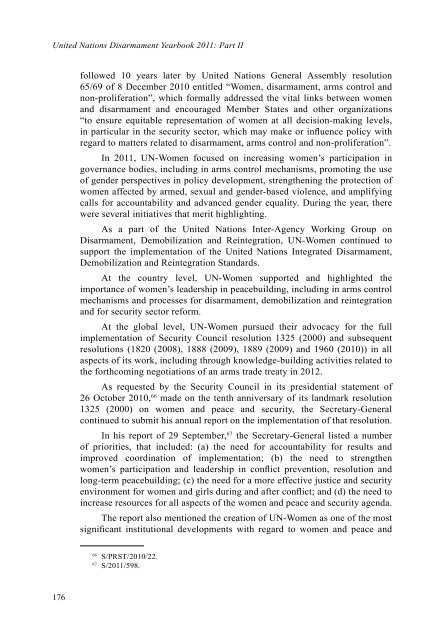DYB2011-Part-II-web
DYB2011-Part-II-web
DYB2011-Part-II-web
Create successful ePaper yourself
Turn your PDF publications into a flip-book with our unique Google optimized e-Paper software.
United Nations Disarmament Yearbook 2011: <strong>Part</strong> <strong>II</strong><br />
176<br />
followed 10 years later by United Nations General Assembly resolution<br />
65/69 of 8 December 2010 entitled “Women, disarmament, arms control and<br />
non-proliferation”, which formally addressed the vital links between women<br />
and disarmament and encouraged Member States and other organizations<br />
“to ensure equitable representation of women at all decision-making levels,<br />
in particular in the security sector, which may make or influence policy with<br />
regard to matters related to disarmament, arms control and non-proliferation”.<br />
In 2011, UN-Women focused on increasing women’s participation in<br />
governance bodies, including in arms control mechanisms, promoting the use<br />
of gender perspectives in policy development, strengthening the protection of<br />
women affected by armed, sexual and gender-based violence, and amplifying<br />
calls for accountability and advanced gender equality. During the year, there<br />
were several initiatives that merit highlighting.<br />
As a part of the United Nations Inter-Agency Working Group on<br />
Disarmament, Demobilization and Reintegration, UN-Women continued to<br />
support the implementation of the United Nations Integrated Disarmament,<br />
Demobilization and Reintegration Standards.<br />
At the country level, UN-Women supported and highlighted the<br />
importance of women’s leadership in peacebuilding, including in arms control<br />
mechanisms and processes for disarmament, demobilization and reintegration<br />
and for security sector reform.<br />
At the global level, UN-Women pursued their advocacy for the full<br />
implementation of Security Council resolution 1325 (2000) and subsequent<br />
resolutions (1820 (2008), 1888 (2009), 1889 (2009) and 1960 (2010)) in all<br />
aspects of its work, including through knowledge-building activities related to<br />
the forthcoming negotiations of an arms trade treaty in 2012.<br />
As requested by the Security Council in its presidential statement of<br />
26 October 2010, 66 made on the tenth anniversary of its landmark resolution<br />
1325 (2000) on women and peace and security, the Secretary-General<br />
continued to submit his annual report on the implementation of that resolution.<br />
In his report of 29 September, 67 the Secretary-General listed a number<br />
of priorities, that included: (a) the need for accountability for results and<br />
improved coordination of implementation; (b) the need to strengthen<br />
women’s participation and leadership in conflict prevention, resolution and<br />
long-term peacebuilding; (c) the need for a more effective justice and security<br />
environment for women and girls during and after conflict; and (d) the need to<br />
increase resources for all aspects of the women and peace and security agenda.<br />
The report also mentioned the creation of UN-Women as one of the most<br />
significant institutional developments with regard to women and peace and<br />
66 S/PRST/2010/22.<br />
67 S/2011/598.


